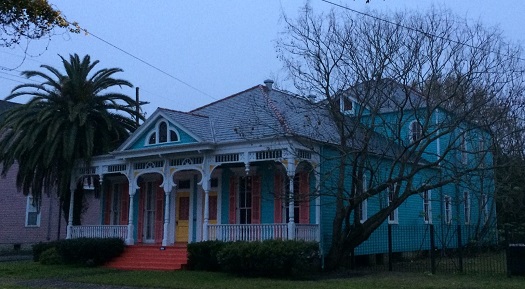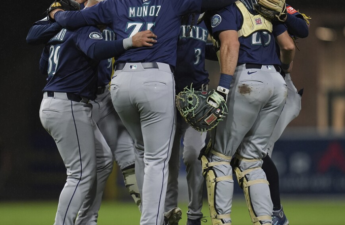The nights got suddenly sultry this week, as the bobbing of 40s and 70s and back again gave way to 80s and March did its job of actually transitioning the seasons over into something warmer and more life-giving than the prior months. We are spoiled here in New Orleans, a phrase that could probably be applied full stop to any number of realities, but I am speaking now mostly in the context of Boston’s record snowfall, more accumulation, probably, than my entire four winters at Brandeis combined. And it doesn’t matter if I’d enjoy record snowfall more than an 80-degree twilight walk home in mid-March. There is much to be said for being able to be outdoors all the time, or more often than not.
I keep trying to compare New Orleans to other places and the facsimiles are often uncanny and yet insufficient. The one that comes up most often and sticks for me lately is San Francisco. Not because of climate, as a summer there is perhaps comparable to a Boston winter, nor because of elevation. San Francisco is famously a series of hills that they’d call mountains in the northeast, whereas New Orleans is functionally (or not so) in the shape of a bowl, with the upper lip starting at sea level, or at least it would be if not for the levees. No, the comparisons are found in the architecture, the streetcars (I’ve noted this similarity recently), the sense of color and life. Even, perhaps, the pirates. They did, after all, call part of San Francisco the Barbary Coast. The palpable sense of looming disaster, be it from earthquakes or hurricanes, mixed with a survivalist triumph of recovery. The importance of music. The legends of a past that was more glorious than now, when all these rambling grand houses shone with new paint, their first coat, and entertained the finest of the city before things fell on slightly harder times.
I haven’t been to San Francisco in several years and it’s possible that the recent spike in prices and even more wealth flowing out of Silicon Valley has ushered in a new age where people perceive this as the peak. Certainly few cities have the ubiquitous sense of surviving a traumatic calamity, at least domestically, to the degree that New Orleans does, carrying the weight of the nearly decade-old disaster like equal parts badge and burden in every conscious act. And yet so many people weren’t here, the city feels over half transplant, at least to the young or those in their thirties like me, and the question of when you came is almost the first for any new acquaintance. The lack of local accent is usually sufficient giveaway, though New Orleans has its own dialect distinct from the rest of the South, often compared to some of the lilts of Boston and New York. It has always, like San Francisco, been a city of migrants or, perhaps more accurately, pilgrims.
For both NOLA and SF carry this sense of place that transcends even the reality of these vaunted cities. They feel different and it feels intense and powerful to be in a city like this. For all the comparisons, both towns are unique. When you are standing in most of SF, you could not be anywhere else. Ditto NOLA. While both carry vibrant rows of eclectic houses in colors louder than the last, one is all Victorian and the other Southern Gothic, and never the twain shall be confused. One row will sit on a high-wire tilt and the other slumping into a sub-sea-level swamp. Both, I suppose, are surrounded by water, but the Bay could not be much different than the combination of bayous, lakes, and the mighty Mississippi. But we have more songs about these cities than perhaps anywhere except New York. The people teeming out of the northeast at various times when folks have dispersed have probably traveled to these two cities more than anywhere else. Nowhere else except for maybe New York and Los Angeles do people arrive at the gates with more anticipation, more certainty of destination, more abandon, reckless and otherwise.
And here we arrive at something unique to New Orleans, something that puts it more in keeping with modern Las Vegas than the peninsular City by the Bay. It is not just the drinking, though that’s part of it. It’s the sense of release. It’s the notion of freedom, the ability to do most anything and not only get away with it, but be embraced and revered for it. Crazy is the norm here. “You have a license to be nuts,” noted one elder stateswoman of the city to me when trying to explain what makes the city magical. She had a defiant grin on her face when she said it, as though to query why anyone would live anywhere else. The alcohol is, mostly, just a cover story. Like getting drunk so often is, it’s an excuse for the abandoning of inhibitions when it’s really just that one wants to be able to let go. And as always has been my retort throughout life, I don’t need alcohol or other substances for that kind of release. I already have the inhibitions of the inebriated, at least as far as the little hang-ups on dancing and reveling and excitement go. I do, admittedly, have pretty tight inhibitions on what I find to be moral lines, which is why I keep my prohibitions as they are. Not many in this city share those sentiments.
But there are codes of conduct here to be admired. Not just in terms of there being no real sense of embarrassment within the city limits. The phrase “Be Nice or Leave” is something near a city motto, hanging on brightly colored signs throughout the city’s private establishments. A fine fitting contrast with “We reserve the right to refuse service to anyone,” functioning as both its reaffirmation and its glorious inverse. There is a real sense that this is not just the policy of the restaurant, the ice cream parlor, the bar, the bowling alley, but it is in fact the standing ordinance of the entire metropolis. If you’re not capable of sitting down to a conversation with a stranger at any time, with being genuinely friendly and interested, with expressing compassion, then you’ve probably wandered onto the wrong pilgrimage. We hear that New York is still accepting new pilgrims of your temperament.
But that’s probably meaner than something any actual New Orleanian would say. Even snide regionally competitive comments are a little out of bounds.
I have never encountered a place where so many people are so consistently genuine, where the common currency is someone’s story and background and feelings, where conversations with the dry cleaner and the Taco Bell cashier cut through small talk into a sense of real connection across the void between our souls. In my beloved West, people say hi to you on the street, but here they will stop and engage and ask where you are going and mean it in a sense more cosmic than an intersection of streets. The streetcar driver will start relating his life story, the waitress will give you a rundown on everything she’s actually going through. It’s not that these interactions never happen elsewhere, but they are more common than not in New Orleans and it gives the sense that here, alone among all places in the United States, there is no pretension at all. Which of course cannot be true at all levels, for there are still gated communities and gated houses and fancy cars and houses and golf courses. But at most rungs of society, most places in public, pretense about this life is absent. We are all just living and communing and trying to get by and life is easier if we’re in this together and I want to learn from you.
Life is hard enough without the barriers we tend to put up. In New Orleans, those barriers so often dissolve like ice in the sunset swelter of the cracked pavement, ten feet below sea level and thousands of miles from anywhere else.



